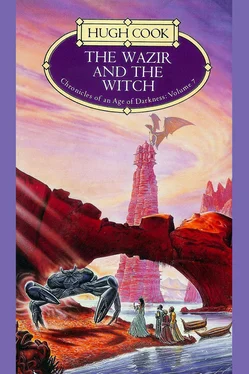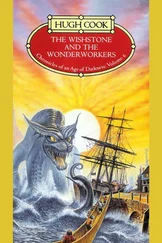Hugh Cook - The Wazir and the Witch
Здесь есть возможность читать онлайн «Hugh Cook - The Wazir and the Witch» весь текст электронной книги совершенно бесплатно (целиком полную версию без сокращений). В некоторых случаях можно слушать аудио, скачать через торрент в формате fb2 и присутствует краткое содержание. Жанр: Фэнтези, на английском языке. Описание произведения, (предисловие) а так же отзывы посетителей доступны на портале библиотеки ЛибКат.
- Название:The Wazir and the Witch
- Автор:
- Жанр:
- Год:неизвестен
- ISBN:нет данных
- Рейтинг книги:5 / 5. Голосов: 1
-
Избранное:Добавить в избранное
- Отзывы:
-
Ваша оценка:
- 100
- 1
- 2
- 3
- 4
- 5
The Wazir and the Witch: краткое содержание, описание и аннотация
Предлагаем к чтению аннотацию, описание, краткое содержание или предисловие (зависит от того, что написал сам автор книги «The Wazir and the Witch»). Если вы не нашли необходимую информацию о книге — напишите в комментариях, мы постараемся отыскать её.
The Wazir and the Witch — читать онлайн бесплатно полную книгу (весь текст) целиком
Ниже представлен текст книги, разбитый по страницам. Система сохранения места последней прочитанной страницы, позволяет с удобством читать онлайн бесплатно книгу «The Wazir and the Witch», без необходимости каждый раз заново искать на чём Вы остановились. Поставьте закладку, и сможете в любой момент перейти на страницу, на которой закончили чтение.
Интервал:
Закладка:
The Empress had been through one trauma too many of late. She had almost been torn apart by centipedes in the Temple of Torture; she had fled for her life in fear of a mob; a dorgi had captured her Downstairs; she had come face to face with a therapist from the Golden Gulag; a second arrest had seen her committed to formal trial.
With her personal history in such disorder, she was not inclined to trust any idle assurances of a happy ever after. She would trust nothing for certain until the soil of Wen Endex was under her feet.
‘What did you say?’ said Idaho, in his warlord voice.
‘I said, Julie darling, that I’m happy to see you here.’
‘Well I’m not happy to be here,’ said Idaho. ‘Not in the same room with two frauds.’
And he drew his sword.
Trasilika and Froissart were terrorstruck, for they had come to the conference unarmed. But Justina never faltered.
‘Julie dear,’ said Justina, ‘put down your sword. These people may be frauds, but they’re my frauds.’
‘What do you mean?’ said Idaho, who was ignorant of the conspiracy.
‘My good friend Uckermark did a deal with these people,’ said Justina calmly. ‘He arranged it with Dardanalti. You see, we’re going to help them prove they’re not frauds. We’re going to do that by helping Froissart here to come through a trial by ordeal.’
‘We’re going to help him?’ said Idaho. ‘But why?’ ‘Because otherwi se Master Ek will kill them.’
‘Then let him!’
‘But then Master Ek would kill us.’
‘Oh,’ said Idaho, absorbing this. ‘So we help this Froissart to keep ourselves from being killed.’
‘Right,’ said Justina.
‘And that means Froissart doesn’t get killed either.’ ‘Right,’ sai d the Empress, beaming.
‘So who does get killed?’ said Idaho. ‘Trasilika?’
‘No,’ said Justina. ‘Nobody.’
‘Oh,’ said Idaho. Then: ‘I’m not sure I really like this.’ As far as he was concerned, a plan in which there was no place for murder was hardly a plan at all.
‘Julie, Julie,’ said Justina, ‘that’s only the theory. In practice things are likely to be much more dangerous. They always are. There’s every chance something will go wrong, every chance in the world. With a little luck, you’ll have people to kill by the dozens.’
And, by the exercise of the gentle arts of persuasion, the Empress slowly drew Idaho into committing himself wholeheartedly to the plot which was hatching.
Justina Thrug then entered upon an activity which, despite the exigencies of her plight, gave her considerable pleasure; this being the planning of a banquet.
Despite the great destruction which had befallen portside Injiltaprajura, the desert side remained unscathed by fire; which meant there would be no shortage of food for the grand occasion.
The highlight of the banquet was to be, of course, Jean Froissart’s trial by ordeal. The revels were scheduled to take place at a banquet just five days prior to the Festival of Light (for which Nadalastabstala Banraithanchumun Ek had yet to find a sacrifice). Such a timetable gave Justina barely enough time to organize everything. Nevertheless, she managed.
Such was the disorder which had befallen the city of late that no corrections had been made to the Directory of its leading personages. So a great many invitations came back with various disappointing notations, such as ‘burnt alive’, ‘died of smoke inhalation’, ‘missing believed dead’, or ‘fled on Turbothot’s bark’. However, overall the response was good.
As Manthandros Trasilika and Jean Froissart were still billeted in Moremo Maximum Security Prison, and declined public appearances on Justina’s advice, Injiltaprajura was possessed by a great curiosity as to their parts and natures; so many who would otherwise have thought it politic to decline an invitation from the Thrug accepted her summons with grateful thanks (as opposed to ungrateful thanks, which are scarcely rare among those who oftentimes find themselves compelled to unpleasant duties by the strict demands of protocol).
However, there was one person whose thanks were ungrateful, and that was Aquitaine Varazchavardan. Justina’s Master of Law was sitting alone at home when his invitation was delivered by the conjuror Odolo, runner of many messages. Varazchavardan took it, read it, accepted it, appraised Odolo of his decision then dismissed him.
Then wished he had not been so quick to send the conjuror away. For the mansion on Hojo Street was desolate, and Aquitaine Varazchavardan was very much alone. Even his slaves and servants had fled; and such was the uncertain state of civic organization that he had no hope of organizing an effective hunt for their recovery. The certain message of this mass desertion was that Varazchavardan’s underlings had little confidence in his continued survival. The wonder-worker could not quarrel with such opinion. He too believed it was only a matter of time before the executioners came for him.
Finding the tension near unbearable, Varazchavardan began to debate whether he should continued existing. There was no release from the moment. Existence itself was becoming a form of unendurable confinement, the intolerable silence of the grand house a punishment in its own right. Under such circumstances, was it an error to endure?
Varazchavardan at last roused himself. He lit every lantern he could find. Then dumped some ice into a glass. What now? Sit and watch the geckos? No. He lit a mosquito coil and watched that instead.
Watching the slowly untwining smoke of the mosquito coil had a most soothing effect on the Master of Law, who allowed himself to drift into fantasy to such an extent that at last he momentarily believed himself to be back in Obooloo, drinking tea and watching the cloud formations shape and reshape in the blue empyrean.
What was the source of Varazchavardan’s despair?
The answer is very simple.
Varazchavardan feared he would ultimately be executed by Aldarch the Third as a consequence of his past association with the Thrug. To preserve himself, he had to flee Injiltaprajura. But he had no hope of escaping by Justina’s airship. For he knew as a certainty what Justina only feared: that the Cabal House would destroy Sken-Pitilkin’s new airship just as it destroyed the first.
Thus Varazchavardan sat alone, watching the geckos and listening to the click of melting ice, and contemplated suicide. In that extremity, he applied the Test of the Moment.
That test consists of this single question:
If I had been created ex nihilo this very moment, would I see the rewards of life as being a sufficient reward for enduring life’s pains, burdens and indignities?
The Test of the Moment was devised by the sagacious philosopher So Da Thee, who was driven to such an expedient as a consequence of his abstemious lifestyle. Among the Korugatu philosophers (and such was Thee) a personal crisis is usually resolved by a recourse to drink. (Methodical recourse to drink is also had in the absence of any such crisis, but that is another story.) Thee, refusing such solace, had devised the Test.
A diligent application of the Test does this: it frees a life from its historical context. An interesting exercise indeed, since most people mostly view life in the light of the hopes and expectations of the past. Those who in youth hoped for paradise find it hard to settle for less, while those brought up with an expectation of living in hell are more easily satisfied — the problem being that those so raised tend to shape the world to the hell of their expectations.
Imagine, then (and we follow Thee in this exercise in fantasy) a speculator who has lost a fortune of a million dragons. In exile, he lives in a fisherman’s shack on the shores of Manamalargo, making his life as a crab catcher. There he laments the loss of his dragons, his pleasure dome and the concubines housed therein.
Читать дальшеИнтервал:
Закладка:
Похожие книги на «The Wazir and the Witch»
Представляем Вашему вниманию похожие книги на «The Wazir and the Witch» списком для выбора. Мы отобрали схожую по названию и смыслу литературу в надежде предоставить читателям больше вариантов отыскать новые, интересные, ещё непрочитанные произведения.
Обсуждение, отзывы о книге «The Wazir and the Witch» и просто собственные мнения читателей. Оставьте ваши комментарии, напишите, что Вы думаете о произведении, его смысле или главных героях. Укажите что конкретно понравилось, а что нет, и почему Вы так считаете.












